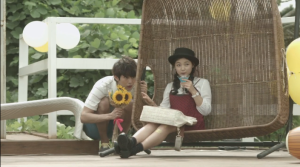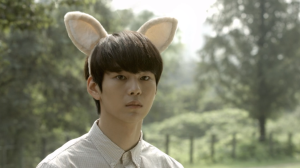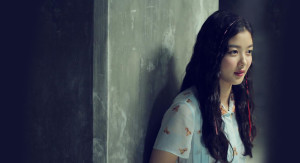“I’d actually like it if the world suddenly ended,” muses Ma Dae-choong, and so begins Love Cells.
The series — literally translated as “Dating DNA”– is based off the popular Naver webtoon of the same name that ran from 2010 through 2012. It premiered online on November 3rd and made headlines for receiving more than 4 million views within three weeks of its launch, unprecedented progress by any web drama thus far.
Warning: spoilers ahead.
Billed as a fantasy-romance, the story centers around the concept of “love cells” in the body which enable humans to experience love. Enter Ma Dae-choong, an unemployed and unmotivated young man whose only interaction with the opposite sex involves getting hit by his landlady. A dying love cell breaks free from his body but is eaten by Dae-choong’s cat, and a flash of magic lightning later finds the love cell in physical form as Nebi, the cat-girl.
 Dae-choong is given an ultimatum by Nebi: get a date within the month, or experience love cell death and ultimately lose the ability to love himself. However, the “date” cannot be a casual affair, as Dae-choong must be in love with the person he likes the most. Tasked with his comically high standards, Nebi sets her matchmaking skills to use between Dae-choong and the only woman he’s interested in, idol-actress Seo-rin. Further complicating matters is the presence of Chun Ji-woon, a Hallyu star and rival for Seo-rin’s affections. Armed with Nebi’s stash of magic attraction gadgets, Dae-choong gets closer to Seo-rin but begins to question the validity of his connection with her as he competes with Ji-woon.
Dae-choong is given an ultimatum by Nebi: get a date within the month, or experience love cell death and ultimately lose the ability to love himself. However, the “date” cannot be a casual affair, as Dae-choong must be in love with the person he likes the most. Tasked with his comically high standards, Nebi sets her matchmaking skills to use between Dae-choong and the only woman he’s interested in, idol-actress Seo-rin. Further complicating matters is the presence of Chun Ji-woon, a Hallyu star and rival for Seo-rin’s affections. Armed with Nebi’s stash of magic attraction gadgets, Dae-choong gets closer to Seo-rin but begins to question the validity of his connection with her as he competes with Ji-woon.
Given the premise and the original webtoon’s comedic overtones, Love Cells is similarly lighthearted in nature. Ridiculous plot devices abound, the most significant being Seo-rin’s extreme allergy to dried squid acting as a catalyst for her meeting Dae-choong and her kidnapping, as well as Nebi’s magic tools which have Dae-choong running around town in animal ears and pink glasses in the most serious of situations. Slapstick is the show’s humor of choice, mainly involving hapless men invoking the rage of their female counterparts as they receive slaps complete with comic-style motion lines.
 The drama is also true to its toon roots visually, as it incorporates many aspects of comic style in its presentation. Screens are often split into multiple panels of characters simultaneously reacting. People, objects, and settings are often labeled rather than revealed through narration, and this is shown in the first scenes as the camera pans over the half-eaten pot of ramen in Dae-choong’s rooftop apartment, a checkmark affirmatively marking a caption that reads, “poor sanitary conditions”. Figurative speech turns literal as Nebi warns Dae-choong to beware living uselessly like dried squid (squid as a recurring motif in the story), and the camera pans down, revealing Dae-choong as the snack himself.
The drama is also true to its toon roots visually, as it incorporates many aspects of comic style in its presentation. Screens are often split into multiple panels of characters simultaneously reacting. People, objects, and settings are often labeled rather than revealed through narration, and this is shown in the first scenes as the camera pans over the half-eaten pot of ramen in Dae-choong’s rooftop apartment, a checkmark affirmatively marking a caption that reads, “poor sanitary conditions”. Figurative speech turns literal as Nebi warns Dae-choong to beware living uselessly like dried squid (squid as a recurring motif in the story), and the camera pans down, revealing Dae-choong as the snack himself.
 The feature that really makes Love Cells shine, however, is the drama’s own self-awareness. Nebi breaks the fourth wall on multiple occasions to give the viewers an ironic stare after a particularly boneheaded comment by Dae-choong or a cheeky smile when she’s gotten her host one step closer to his love confession. The segments of the show that directly address the viewers are some of the most enticing of each episode. Each magic item Nebi pulls out cuts to a commercial break, featuring a cameo by g.o.d’s Park Joon Hyung, who hilariously attempts to market each product to the viewers with a touch of crass seductiveness. The mini-interviews held by Nebi at the end of each episode are equally engaging, as she Sex and the City style poses a personal question about a relationship or profound question regarding love to a minor character that relates to the episode at hand. These questions give a glance into the personalities that the drama does not have the time to delve into (a personal favorite is the Seo-rin fanclub president) but also have the opportunity to further the plot unexpectedly.
The feature that really makes Love Cells shine, however, is the drama’s own self-awareness. Nebi breaks the fourth wall on multiple occasions to give the viewers an ironic stare after a particularly boneheaded comment by Dae-choong or a cheeky smile when she’s gotten her host one step closer to his love confession. The segments of the show that directly address the viewers are some of the most enticing of each episode. Each magic item Nebi pulls out cuts to a commercial break, featuring a cameo by g.o.d’s Park Joon Hyung, who hilariously attempts to market each product to the viewers with a touch of crass seductiveness. The mini-interviews held by Nebi at the end of each episode are equally engaging, as she Sex and the City style poses a personal question about a relationship or profound question regarding love to a minor character that relates to the episode at hand. These questions give a glance into the personalities that the drama does not have the time to delve into (a personal favorite is the Seo-rin fanclub president) but also have the opportunity to further the plot unexpectedly.
“Is there someone you became so used to that you didn’t realize they were special?” Nebi asks the audience, and slowly lowers her microphone as her shoulders slump forward dejectedly, a certain someone on her mind.
 Let’s talk about the ending. From the start, Dae-choong and Nebi’s relationship could be classified as complicated — she’s a cell from his body, his cat, his teacher in love, his first friend, and despite her spitfire attitude, completely dependent on him for her survival. When Dae-choong ultimately fails in his mission to seduce Seo-rin and witnesses Nebi executed at the hands of the God of Dating, it’s assumed that he’s lost his love cell forever. Running into his first love who looks just like Nebi six months later raises a variety of questions: is this girl Nebi, or did Nebi, as his love cell, merely take the form of this girl, his first love? Is Dae-choong even capable of love anymore? The song that plays at the close with lyrics that say, “My sadness now is alright, if only I’m your last love” could mean a bittersweet ending as Dae-choong finally meets the girl after he’s been stripped of his capability to love, or a more hopeful interpretation that his last love has just begun.
Let’s talk about the ending. From the start, Dae-choong and Nebi’s relationship could be classified as complicated — she’s a cell from his body, his cat, his teacher in love, his first friend, and despite her spitfire attitude, completely dependent on him for her survival. When Dae-choong ultimately fails in his mission to seduce Seo-rin and witnesses Nebi executed at the hands of the God of Dating, it’s assumed that he’s lost his love cell forever. Running into his first love who looks just like Nebi six months later raises a variety of questions: is this girl Nebi, or did Nebi, as his love cell, merely take the form of this girl, his first love? Is Dae-choong even capable of love anymore? The song that plays at the close with lyrics that say, “My sadness now is alright, if only I’m your last love” could mean a bittersweet ending as Dae-choong finally meets the girl after he’s been stripped of his capability to love, or a more hopeful interpretation that his last love has just begun.
It’s worth mentioning that each episode of Love Cells averages seven minutes, and a total of fifteen episodes makes the series just over an hour long. There are benefits to this time constraint as a story this short must be stripped of all unnecessary plot fillers and over-indulgence but also crunches a lot of the developing chemistry between characters. Viewers only get glimpses of Dae-choong and Nebi’s growing affection for the other in a series of flashbacks after Nebi’s death, and other potential drama developments such as Ji-woon’s assault lawsuit are filed and settled in the span of a minute, bringing into question the point of even introducing such problems. The final clip of the series however, featuring the God of Dating, seems to hint at a sequel to the series from the God’s point of view and hopefully will fill in some plot holes should the sequel come into fruition.
 The drama boasts some seasoned stars, including Kim Yoo-jung, Jang Hyuk, Kim Woo-bin, and Oh Kwang-rok alongside more amateur actors like the protagonist and leading lady respectively, Park Sun-ho and Nam Ji-hyun. The cast list alone is a contributor to the success of Love Cells, but some credit must be given to the production and the story, which left quite a few questions but ultimately introduced an engaging crew of characters and unique plot that ended with audiences hoping for more. Love Cells is at it’s core enjoyable entertainment, and at an hour long, it’s worth its value in time as a cute drama with potential for greater plot progression to come.
The drama boasts some seasoned stars, including Kim Yoo-jung, Jang Hyuk, Kim Woo-bin, and Oh Kwang-rok alongside more amateur actors like the protagonist and leading lady respectively, Park Sun-ho and Nam Ji-hyun. The cast list alone is a contributor to the success of Love Cells, but some credit must be given to the production and the story, which left quite a few questions but ultimately introduced an engaging crew of characters and unique plot that ended with audiences hoping for more. Love Cells is at it’s core enjoyable entertainment, and at an hour long, it’s worth its value in time as a cute drama with potential for greater plot progression to come.
Rating: 3.8/5
(Osen, Naver, Images via Sidus HQ, Dramafever)



